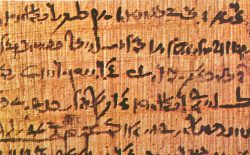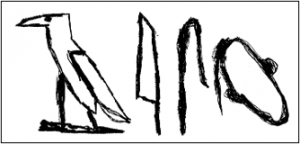 The Greeks, or at least some of them, well understood the importance of the brain even if they did not know very much about its inner workings. And the Egyptians before them had a hieroglyph for the brain, the first known recorded reference to the brain being an Egyptian papyrus from the seventeenth century BCE describing a couple of patients who had suffered trauma to the head. The Greek surgeon-philosopher Hippocrates, or at least his translators (1), was a beautiful almost poetic writer, here is what he said about the brain (2), (3):
The Greeks, or at least some of them, well understood the importance of the brain even if they did not know very much about its inner workings. And the Egyptians before them had a hieroglyph for the brain, the first known recorded reference to the brain being an Egyptian papyrus from the seventeenth century BCE describing a couple of patients who had suffered trauma to the head. The Greek surgeon-philosopher Hippocrates, or at least his translators (1), was a beautiful almost poetic writer, here is what he said about the brain (2), (3):
From Hippocrates, ‘The Sacred Disease’ (5th century BC)
Men ought to know that from the brain, and from the brain only,
arise our pleasures, joys, laughter and jests,
As well as our sorrows, pains, griefs and tears. And fears.
Through it, in particular, we think, see, hear.
And distinguish the ugly from the beautiful, the bad from the good.
The pleasant from the unpleasant.
It is the same thing which makes us mad or delirious,
Inspires us with dread and fear.
Whether by night or day,
Brings sleepiness, inopportune mistakes, aimless anxieties,
absent mindedness, and acts that are contrary to habit.
These things that we suffer all come from the brain when it is not healthy,
But becomes abnormally hot, cold, moist, or dry.
Or suffers any other affection to which it is not accustomed.
 Madness comes from its moistness.
Madness comes from its moistness.
When the brain is abnormally moist, of necessity it moves,
And when it moves neither sight nor hearing are still.
But we see or hear one thing and now another.
And the tongue speaks in accordance with the things seen and heard on any occasion.
But when the brain is still, a man can think properly. (Author’s italics).
- These words are closely based on the translation by W.H.S Jones, London and New York: William Heinemann and Harvard University Press, 1923. The words were manually copied by the author from Principles of Neural Science (Sixth Edition) . LCCN 2020951979.
- We cannot of course for certain attribute the words and their subjective or objective meanings to Hippocrates .
- The author has made some minor changes to words to help general contemporary understanding. For details of the changes, the text can be compared against the text set out in PoNS.
- Image sources: Wikimedia Commons and the author’s own sketch.